Best Vitamin C Whole Foods
Vitamin C plays an important role in keeping your immune system healthy, but it does far more than that. This essential vitamin also acts as a powerful antioxidant and anti-inflammatory, leading to a number of other impactful applications beyond keeping your immune system healthy.
Here are the best vitamin C supplements on the market, ranked. Afterwards, we'll break down what vitamin C does and how a supplement can benefit your body.
Rankings
1. DACHA Liposomal Vitamin C
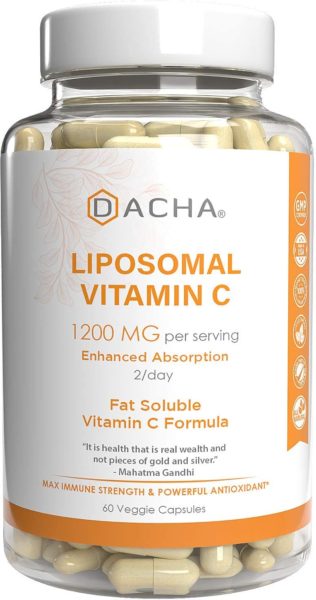
Check price at Amazon
DACHA makes a tremendous vitamin C supplement that uses a unique approach to boosting bioavailability and absorption.
By binding the ascorbic acid (vitamin C's chemical name) to fat-soluble molecules, DACHA aims to make their vitamin C absorbed more readily by your body, helping it cross through membranes and into your body's cells.
With over 1000 mg of vitamin C per serving, the dosage is fantastic, too, making it our number one pick of the year.
2. Doctor's Best Vitamin C
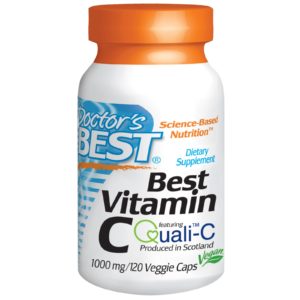
Check price at Amazon
Doctor's Best Vitamin C is a pretty standard vitamin C supplement. Sometimes, however, standard is just what you need. As the saying goes, "Simple 'ain't easy."
Each capsule provides 1000 mg of vitamin C, in a proprietary form known as Quali-C. There's nothing fancy about this form; it's really just ascorbic acid, but the company that supplies it guarantees its purity.
This is reflected in independent lab testing of Doctor's Best Vitamin C. In analytical assays, its actual vitamin C content comes in at 1070 mg, just seven percent over the label listed amount. This means there is good quality control in the manufacturing process and you're getting exactly what you pay for.
3. Garden of Life Vitamin Code Raw C
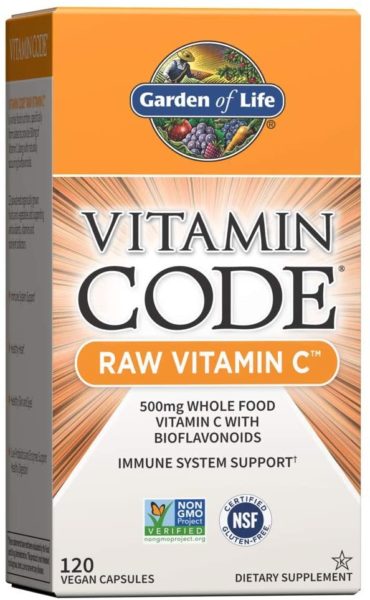
Check price at Amazon
Garden of Life uses naturally-produced ascorbic acid as the source for their vitamin C, but they go above and beyond other brands by including a huge range of extracts from fruits and vegetables like broccoli, apple, carrot, bell pepper, and kale.
These ingredients give you phytonutrients you wouldn't be getting if you just took pure vitamin C. And, at 500 mg of vitamin C per serving, you're not skimping on dosage, either.
4. Bulk Supplements Vitamin C
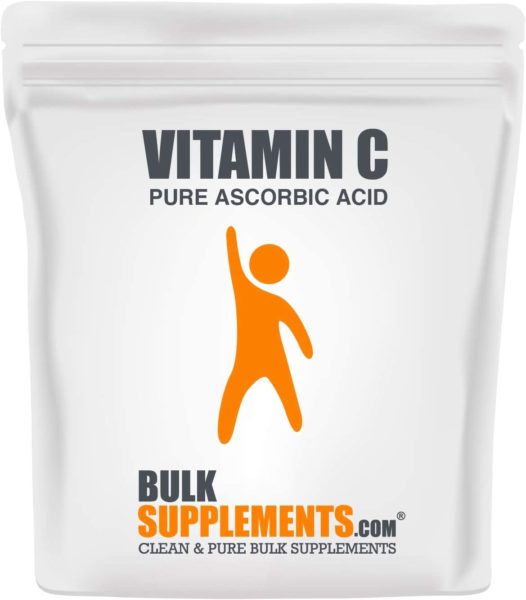
Check price at Amazon
Bulk Supplements is a company that is widely known for their low cost, high quality philosophy. Bulk supplements sells its products in a loose powder form in a simple resealable foil bag, always in a highly purified form without any flavoring agents or adulterants.
That's the case with their vitamin C supplement too. It's 100% ascorbic acid—in independent lab testing, it easily lives up to its claim.
The advantage of this is that you can determine exactly how much you need, at what time, and in what format. Since ascorbic acid (the chemical name for vitamin C) is water soluble, you can dissolve the exact amount of vitamin C that you need in water, a protein shake, a smoothie, or pretty much any other liquid you want.
If you don't mind taking the time to measure out the supplement with a scoop or a scale, Bulk Supplements should be your number one choice if you are looking for bulk vitamin C.
5. Nature's Bounty Vitamin C
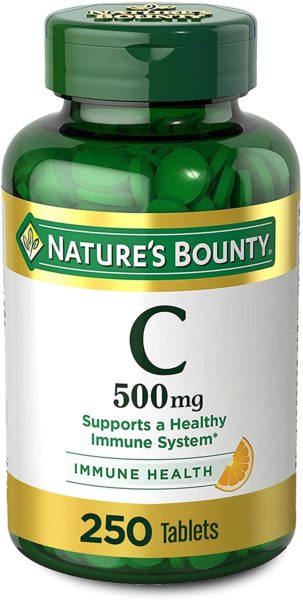
Check price at Amazon
Nature's Bounty is super-simple formulation that delivers 500 mg of vitamin C per dose.
In terms of other ingredients, the tablet form demands some binders, anti-caking agents, and excipients, so the ingredient list is a bit longer than usual.
However, Nature's Bounty Vitamin C scores very well on purity testing, with independent analytical testing determining that its actual vitamin C content was within four percent of its label-stated amount.
6. Solaray Vitamin C
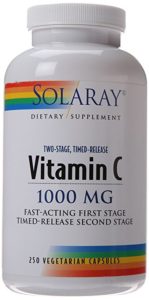
Check price at Amazon
Though it's not a common brand, Solaray Vitamin C sells surprisingly well online. It provides its 1000 mg of vitamin C in three forms: traditional ascorbic acid, rose hips (an herbal extract rich in vitamin C), and acerola cherry, another fruit rich in vitamin C.
According to independent analytical testing, the tablets actually contain 1060 mg of vitamin C per serving, which is quite good. That's an error of only six percent.
There's also no funny business with strange or unnecessary inactive ingredients either, making Solaray Vitamin C a good call if you want a slow release formula.
7. Now Foods Vitamin C
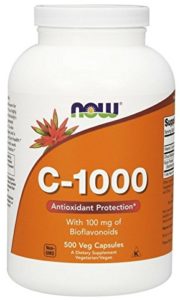
Check price at Amazon
Another among the big brands, Now Foods offers supplements starting with just about every letter of the alphabet. Vitamin C is no exception—Now Foods makes a 1000 mg vitamin C tablet that's standard in most regards.
The purity of the ingredients is average; independent lab testing pegged its true vitamin C content at 928 mg per tablet. Though it's disappointing to see a number lower than the advertised amount, this is still less than a ten percent difference between label-claimed and actual vitamin C content.
8. New Age Vitamin C Gummies
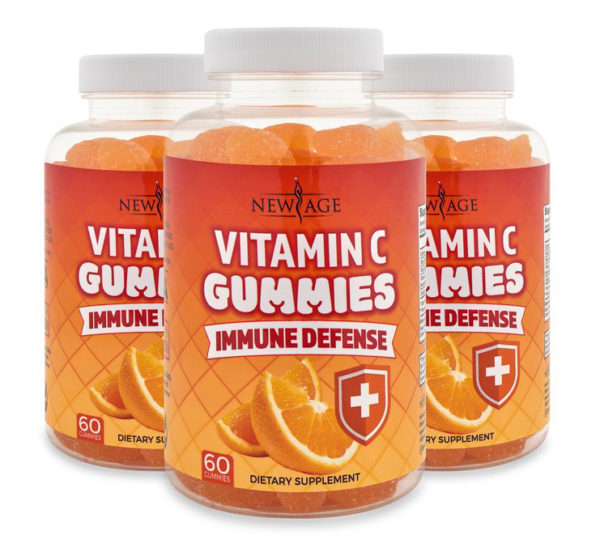
Check price at Amazon
Tablets and capsules not your thing? New Age makes a great gummy vitamin C supplement that has a solid dosage and relatively few extraneous ingredients.
Of course, any gummy vitamin requires more ingredients for flavoring and texture, but New Age keeps them to a minimum without compromising much on the dose. As far as gummy-based vitamin C supplements go, it's easily the best.
9. Emergen-C Super Orange
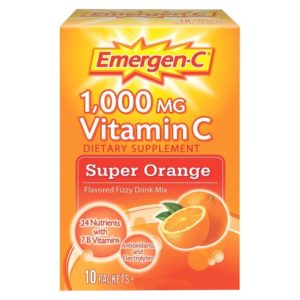
Check price at Amazon
Practically a household name by now, Emergen-C comes in a flavored powder in individual packets that you can add to water or another drink to deliver 1000 mg of vitamin C per packet, along with several other vitamins and minerals aimed at boosting your immune system.
The other two notable vitamins and minerals delivered in major quantities in Emergen-C are vitamin B6 and vitamin B12. These are included in amounts of 10 mg (500% of your recommended daily intake) and 25 mcg (417% of recommended daily intake).
Because of this sugar, Emergen-C is not a good choice for a daily vitamin C supplement. As an occasional supplement to use if you get a cold, though, it should do its job.
10. Airborne Vitamin C
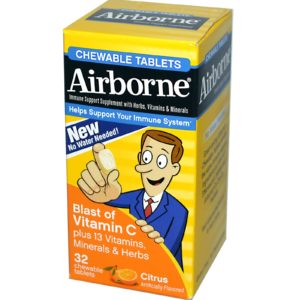
Check price at Amazon
Airborne is not quite the market juggernaut it used to be, but it's still a well-selling vitamin C supplement. Like Emergen-C, it's marketed as a countermeasure against mild illness.
Vitamin C is the main ingredient, with each tablet delivering 1000 mg of it. A notable difference is that Airborne does not include any B vitamins aside from riboflavin.
Disappointingly, Airborne also includes the controversial artificial sweetener acesulfame potassium, as well as sucralose, sorbitol, and artificial flavoring. If you care about well-vetted ingredients in your supplements, you might want to look elsewhere.
11. Ester-C Vitamin C
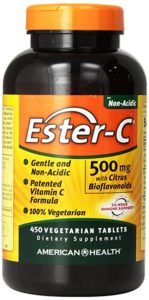
Check price at Amazon
This vitamin C supplement is unusual because it does not deliver its vitamin C in the standard format of ascorbic acid. Instead, it uses a salt form, calcium ascorbate, which is this company's patented formulation.
Each tablet delivers 500 mg of vitamin C, along with a 200 mg mixture of citrus fruit extracts, but aside from that, there's not much to get excited by.
Category winners
Best vitamin C supplement overall: DACHA Liposomal Vitamin C
DACHA makes a unique vitamin C supplement that's designed to make the vitamin C fat-soluble. This means potentially quicker absorption and better bioavailability, garnering our top overall spot.
Best vitamin C supplement for immune function: DACHA Liposomal Vitamin C
To boost immune function with vitamin C, your best shot is a high-dose supplement that's super simple. That's why we chose DACHA, which provides over 1000 mg of vitamin C in an easily-absorbed format.
Best vitamin C supplement for workout recovery: Nature's Bounty Vitamin C
For optimal workout recovery, you don't want the dose to be too high—otherwise you might override your body's natural inflammation-based adaptation. Nature's Bounty Vitamin C, with 500 mg of vitamin C per capsule, is a nice compromise.
Best naturally-sourced vitamin C supplement: Garden of Life Vitamin Code Raw C
Garden of Life has made a name for itself as the best source for micronutrients in their natural form, and that's exactly what you get with Vitamin Code Raw C. With yeast-produced vitamin C and extracts from a dizzying array of fruits and vegetables, you get a host of phytonutrients alongside the vitamin C.
Best bulk vitamin C: Bulk Supplements Vitamin C
If you're mixing up your own protein shakes, smoothies, or meal replacements, and need a good source of vitamin C, the ultra-pure bulk powder from Bulk Supplements is a clear winner.
Best gummy vitamin C supplement: New Age Vitamin C Gummies
Gummy supplements usually mean low dosage and lots of artificial flavors and colors, but New Age does a good job of keeping the dosage high (250 mg per serving) and using only natural flavors and color from paprika.
Who should buy vitamin C?
You should buy vitamin C if you are looking for a simple, straightforward, and effective anti-inflammatory supplement that is very well-researched and has a broad range of applications. In contrast to products like a joint supplement , vitamin C is a supplement that has potent antioxidant effects across your body.
It's used in a wide range of biological processes, so it finds applications in everything from boosting your immune system to preventing muscle damage and soreness during and after exercise to potentially reducing the risk of dementia and cognitive decline.
However, since it's been so well-studied, we also know that vitamin C exerts relatively small to moderate-sized effects in most cases where it's been studied.
So, in this sense, it's an "old school" supplement that is just trying to nudge your body in the direction of better health. It's not a cutting-edge, innovative supplement that's going to radically change the direction of your health, and it's definitely no substitute for a healthy diet and a physically active lifestyle.
Looking for a supplement that could completely rewire your brain and boost your cognitive performance beyond its natural levels? Then vitamin C isn't going to do the trick (try a nootropic instead).
However, if you want to reduce overall inflammation levels and potentially slow the progress or reduce your risk for cognitive decline, vitamin C might be a better option. This is just one example, but it gives a flavor to the kinds of benefits you can (and cannot) get from vitamin C supplementation.
One final thing to note is that vitamin C's antioxidant benefits aren't confined to inside your body—vitamin C also exerts cosmetic benefits when applied to your skin. See our article on vitamin C serums for more on the cosmetic applications and benefits of vitamin C.
How we ranked
With a straightforward supplement like vitamin C, simplicity, purity, and a proper dosage is the name of the game. When formulating our rankings, we aggregated all of the supplements on the market that prominently feature vitamin C.
Then, we eliminated those supplements that included vitamin C alongside other biologically active supplemental ingredients (say, vitamin E for example).
Our reasoning here was to give you as much control as possible over the dosage and balance of all of the supplements you are taking. While vitamin C does often work well in conjunction with other supplements, including vitamin E, the precise dosage of each that is ideal depends on the specific application.
To make sure our vitamin C supplements were the most versatile and flexible options out there, we made sure their only active ingredients were vitamin C (and in a few cases, other phytonutrients that naturally accompany vitamin C in citrus fruits).
From here, we identified the brands that provided the best dosage and purity within three distinct categories. First off was capsule-based vitamin C supplements.
We aimed for highly pure products that delivered 500-1000 mg of vitamin C per capsule, and rewarded brands that used independent lab testing to verify their purity.
Next up, we looked for powder-based vitamin C supplements for people who want precise control over their vitamin C intake, or who want to mix vitamin C into a protein shake or smoothie. Here, BulkSupplements was the clear winner on all fronts, so it was the only powder-based product we included in the rankings.
Finally, we acknowledged that some people (particularly children) don't like or aren't able to swallow standard vitamin C tablets. For these people, we made sure to include dissolvable or chewable gummy-based vitamin C.
While these products required some sacrifices on the purity front, it's nevertheless a niche that needs to be filled. The lower purity of these supplements explains why they ended up at the bottom of our rankings.
Benefits
Our attraction to Vitamin C as a cure for the common cold started in the 1970s.That's when a man named Linus Pauling told the world to start taking heavy doses of Vitamin C. In his book How to Live Longer and Feel Better, he recommended megadoses (an actual scientific term) of the vitamin to ward off the common cold, among other things.
Why did the world listen to this man?
Because he was (and still is) considered one of the top scientific minds of all time (1). He pretty much single-handedly founded the fields of quantum chemistry AND molecular biology. He was awarded two different Nobel prizes, in two different categories (chemistry and peace).
The man was brilliant so the world listened when he told us to take way more Vitamin C than anyone thought was possible. So what if it brought on a "laxative" effect. Kidney stones? No sweat if it means no more colds. The word spread and soon Vitamin C and "cure for the common cold" were linked forever.
Even though Linus Pauling's advice may not have produced results out the way he hoped, people still line up to buy Vitamin C to this day.
Scientific data has poured in since Pauling's book came out.To try and help people sort out the facts, The U.S. National Library of Medicine has an official government statement on Vitamin C and colds: the research is "conflicting" (2).
This doesn't seem very clear, and that's because the efficacy of Vitamin C depends on who you are, where you live, and precisely what result you're seeking when you take the supplement.
No studies have yet been able to establish a link between taking a Vitamin C supplement and preventing a cold.
Vitamin C may do something for colds, but not what you may think.Perhaps if you're a long-distance runner living in Iceland, you will see a benefit from Vitamin C supplementation. The only shred of evidence supporting any positive effect of Vitamin C on the common cold was seen on people who were exerting themselves very heavily in winter environments. Details are as follows:
In 2007 a review study was conducted, and then updated in 2013 (3). What that means is researchers looked at all the controlled trials ever performed involving Vitamin C, dating way back to 1966.
That's 40 years of Vitamin C research rolled into one totally succinct report.
The review study involved thirty trials comparisons and over 11,000 participants. It was found that taking Vitamin C supplements to prevent a cold was no more effective than taking the placebo.
In other words, mega-dosing yourself with C will not keep you from getting a cold. It won't even lessen your chances.
But the part about the cold-weather endurance athletes holds true: the same review study found an 8% chance that the cold would end sooner if they took Vitamin C. They were skiers, marathon runners, and soldiers operating in sub-arctic environments.
Doctors speculate that the reason for the benefit is because these super athletic cold-weather types have a Vitamin C deficiency. By dosing themselves with C, they're simply bringing their levels back up to normal.
So in no way should we deduce from that the need to mega-dose ourselves with Vitamin C in order to prevent, shorten, or treat the common cold.
Vitamin C may be outclassed by zinc for treating the common cold.Turns out we've been looking down the wrong supplement path the whole time. Researchers in the UK have revealed that Zinc, not Vitamin C, is the magic cold-fighter (4).
In another look-back study involving 67 different studies, remedies for the common cold, including Vitamin C supplements, were examined. There were no clear benefits to be found in any of the research for any of the traditional remedies except for zinc and washing your hands a lot.
Side effects
Vitamin C is a water-soluble supplement, which means that it is very hard to take too much. When your body gets excessive vitamin C, it can usually just excrete the extra vitamin C in your urine.
In fact, several clinical trials have used very high doses of vitamin C (10,000 mg of vitamin C per day) for up to three years without recording any significant adverse effects ( 5 ).
Still, according to the Mayo Clinic, too much vitamin C can cause mild to moderate diarrhea, nausea, cramping, headaches, and insomnia ( 6 ).
Most of these side effects are attributable to high concentrations of unabsorbed vitamin C pulling water into the digestive tract. These side effects are very unlikely to appear in anyone at doses of 2000 mg per day or less.
Recommended dosage
Vitamin C is typically studied in clinical trials at doses ranging from 100 to 1000 mg per day or more. On the other hand, the recommended minimum daily intake is only 90 mg for men and 75 mg for women ( 7 ).
As noted above, the tolerable upper limit of vitamin C is 2000 mg per day for adults, which means that doses below this amount are well-tolerated and not expected to result in any side effects. As such, as long as you're below this amount, the right dosage is going to depend on the explicit purpose of vitamin C supplementation that you are aiming at.
For example, if you are looking to prevent illness after a marathon, triathlon, or another long and difficult athletic event, 600 mg seems to be the right dosage.
Preventing muscle soreness may require much higher doses (1000 mg per day or more). On the other hand, lower doses have been studied for treating chronic inflammation among people with metabolic disease, and as little as 100 mg per day has been beneficial in observational research on reducing the risk of chronic diseases.
FAQ
Q: What is vitamin C?
A: Vitamin C is a simple molecule that is one of the oldest known vitamins. It functions as an antioxidant in your body, which means that it takes advantage of its molecular structure to absorb free radicals, which cause chemical chain reactions and damage the cells of your body.
Vitamin C can capture these free radicals, halting these damaging chain reactions and preventing cellular damage. Maintaining high levels of vitamin C is important for everything from your immune system to your eyesight, highlighting the broad importance of this simple nutrient.
Q: What are the benefits of vitamin C?
A: Vitamin C is a heavily studied vitamin, and the balance of the evidence suggests that, while vitamin C might not bring about the major changes in long-term health that many people hope for, it can be useful at several specific applications.
Its role in boosting your immune system seems to help prevent infections after tough athletic events like ultra marathons or triathlons, and some evidence suggests that it may help stave off cognitive decline.
Vitamin C is also very helpful if you are trying to boost your iron levels, because iron absorption is substantially enhanced in the presence of vitamin C. For these and other niche applications, vitamin C supplementation can make a lot of sense.
Q: What foods are highest in vitamin C?
A: Not surprisingly, the foods with the highest concentration of vitamin C per serving are pretty much all fruits and vegetables. Oranges, strawberries, kiwi fruit, bell peppers, broccoli, and Brussels sprouts are some of the foods that have the most vitamin C.
Each of these fruits and vegetables has at least 60% of your recommended daily intake of vitamin C per 100 grams of food, and bell peppers and kiwi fruit have over 100%.
These are some of the most efficient ways to get vitamin C in your diet from natural sources, though supplementation is also an option, especially if you are looking for high-dose vitamin C.
Q: How does vitamin C help your body?
A: Vitamin C is an essential vitamin for everything from immune function to maintaining eyesight. It's also a powerful antioxidant, and helps capture free radicals and prevent them from causing damage to your body's cells.
It's also beneficial for high level athletes in certain circumstances, as research shows it may be able to help reduce or prevent muscle soreness, and prevent infection and illness after extremely demanding workouts.
Q: How much vitamin C is too much?
A: In practice, it's very hard to overload on vitamin C since it is a water soluble vitamin. The tolerable upper limit for vitamin C intake, established by the National Institute of Health's Office of Dietary Supplements, suggests that up to 2000 mg of vitamin C per day is not likely to result in any adverse effects.
Clinical research has used doses beyond this level, up to 10,000 mg per day for up to three years, with no serious adverse effects, though at high doses it's possible to get gastrointestinal issues merely from the volume of vitamin C dissolved in your stomach.
Keeping your supplemental vitamin C intake below 2000 mg per day is an easy way to make sure that none of these issues happen, while still getting any possible benefits from the supplement.
Q: What does vitamin C do for your skin?
A: Vitamin C, as you know by now, is a powerful antioxidant, which means that it can prevent damage incurred by free radicals and oxidizing agents in your body.
One area of your body that suffers to a significant degree from oxidative damage is your skin: the ultraviolet light in sunlight creates free radicals, which damage skin cells, destroy the collagen matrix that holds skin cells together, and cause aging of your skin.
One potential solution to this is to prevent or perhaps even reverse this oxidative damage with a strong antioxidant like vitamin C. It turns out that this is indeed a good solution for keeping your skin young, radiant, and healthy, but the most effective way to deliver vitamin C to your skin isn't through a tablet—it's through a vitamin C serum .
These supplements are topical solutions that deliver vitamin C directly to the areas of skin that you care about, such as your face, neck, shoulders, and chest. Though the supplement that delivers it is different, the mechanism of action is exactly the same.
Q: How long does vitamin C stay in your system?
A: Vitamin C has an extraordinary ability to stay in your body for a long time—unlike other supplements, which may only last for a few hours in your body, small to medium doses of vitamin C can last inside your body for eight to 40 days, depending on the person.
This is likely because your body is adapted to storing and using vitamin C for long periods of time without fruit or vegetable consumption, from hardships earlier in human history.
Given how important vitamin C is for maintaining health, it makes sense that your body would have a mechanism for maintaining high levels of vitamin C even with sparse or intermittent intake. The very long elimination half life of vitamin C suggests that you don't need to be perfect with your vitamin C intake to maintain high levels of vitamin C in your body.
Related articles
- Vitamin C serum
- Vitamin E
- Vitamin D
- Antioxidants
- Eye vitamins
- Iron
- Calcium
Recap
Vitamin C may not have the massive and long-lasting health benefits that some early researchers had hoped for, but it does have some specific niche applications in supplementation.
For high-level athletes, vitamin C could help prevent muscle soreness after particularly tough workouts, and could help prevent illness after arduous competitions as well.
Some evidence suggests that vitamin C supplementation could be associated with a decreased risk for Alzheimer's disease, though research to date is not conclusive.
V itamin C is quite safe, with no side effects up to doses of 2000 mg per day. Most research uses a daily dose of 500 to 1000 mg per day, though some research has found benefits with doses as low as 100 mg per day. Though many people get sufficient vitamin C in their diet, some might benefit from supplementation for specific, additional benefits and niche uses.
For BodyNutrition's #1 vitamin C recommendation, click here.
Source: https://bodynutrition.org/vitamin-c/



0 Komentar